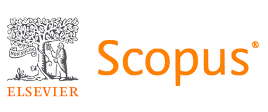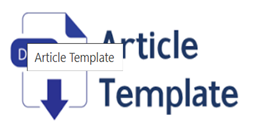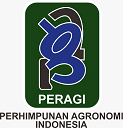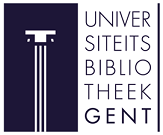The Influence of Program Effectiveness on the Sustainability of the Farmer Food Corporation (KPP) Business at PT. XYZ
Abstract
PT. XYZ is one of the Farmer Food Corporations (KPP) in Ciamis Regency, providing services ranging from production facilities to facilitating credit capital applications. This farmer corporatization program benefits farmers by increasing their income, thus necessitating the sustainability of PT. XYZ. Therefore, it is crucial to examine the effectiveness of the PT. XYZ program, its sustainability level, and the impact of its effectiveness on business sustainability. This study employs an integrated (mixed method) approach with a dominant quantitative design. The population comprises rice farmers who are members of the Farmer Food Corporation in Ciamis Regency under PT. XYZ. A sample size of 51 respondents was selected using a simple random sampling method to ensure equal representation. The effectiveness of the PT. XYZ program was analyzed descriptively through a descriptive statistical analysis approach, and the Partial Least Square (PLS) Structural Equation Model (SEM) analysis was performed to understand the influence of program effectiveness on PT. XYZ's business sustainability. The research results indicate that all variables influence the effectiveness of the PT. XYZ programs are constructed by real manifests, with contributions ranging from medium to high. The five manifest variables constructing effectiveness are program objectives, real change, program socialization, precision, and monitoring. The sustainability variable is constructed by market, workplace, environment, and community variables. The program's effectiveness has a significant influence on PT. XYZ's business sustainability. In conclusion, the PT. XYZ program effectively enhances farmers' income and contributes significantly to the sustainability of PT. XYZ's business. Continuous improvement in program implementation and monitoring is essential to maintain and enhance these benefits.
Keywords
Full Text:
PDFReferences
Aeda, N., & Jannah, R. (2022). Implementasi dan Efektifitas Program Keluarga Harapan (PKH) dalam Meningkatkan Kesejahteraan Ekonomi Masyarakat. Studi di Desa Kekait Kecamatan Gunungsari Kabupaten Lombok Barat. Journal of Economics and Business, 8(1), 165–186.
Astawa, I. N. G., Dwiyani, R., Mayadewi, N. N. A., Manulang, P. K., & Astiningsih, A. A. M. (2023). The Effect of Application of Diplazium Esculentum Leaf Extracts and GA3 on the Berry Quality of Grape (Vitis Vinifera L.) Cultivar of ‘Prabu Bestari.’ Agro Bali : Agricultural Journal, 6(2), 241–248. https://doi.org/10.37637/ab.v6i2.1218
Astuti, V. S., Rahmadi, A. N., & Sandy, D. (2022). Efektivitas E-Government Siap Pemkot Probolinggo dalam Meningkatkan Kinerja Pegawai Kantor Kecamatan Wonoasih. Journal of Innovation Research and Knowledge, 1(12), 1585–1590.
Bednarska-Olejniczak, D., Olejniczak, J., & Svobodová, L. (2019). Towards a smart and sustainable city with the involvement of public participation—The case of Wroclaw. Sustainability, 11(2), 332.
Dulebenets, M. A. (2022). Multi-objective collaborative agreements amongst shipping lines and marine terminal operators for sustainable and environmental-friendly ship schedule design. Journal of Cleaner Production, 342, 130897.
Ekowati, T., Prasetyo, E., & Eddy, B. T. (2020). Konsolidasi lahan pertanian untuk meningkatkan produksi, produktivitas dan pendapatan petani. Jurnal Sosial Ekonomi Dan Kebijakan Pertanian, 4(1), 192–205.
Engelbart, D. C. (2023). Augmenting human intellect: A conceptual framework. In Augmented Education in the Global Age (pp. 13–29). Routledge.
Franks, J. R. (2022). UK Agriculture at a Crossroads. Outlook on Agriculture, 51(4), 448–459.
Gasparatos, A., El-Haram, M., & Horner, M. (2007). The argument against a reductionist approach for assessing sustainability. International Conference on Whole Life Urban Sustainability and Its Assessment, Glasgow.
Gugissa, D. A., Abro, Z., & Tefera, T. (2022). Achieving a climate-change resilient farming system through push–pull technology: evidence from maize farming systems in Ethiopia. Sustainability, 14(5), 2648.
Gusmerotti, N. M., Testa, F., Corsini, F., Pretner, G., & Iraldo, F. (2019). Drivers and approaches to the circular economy in manufacturing firms. Journal of Cleaner Production, 230, 314–327.
Idhayanti, R., Arrazaq, R., & Irwansyah, R. M. (2022). Multifunctional Rice Farmings as The Main Commodity in Sawahan Village, Boyolali, Regency. Journal of Global Environmental Dynamics, 3(3), 46–50.
Jaya, I., & Sumertajaya, I. N. (2008). Pemodelan persamaan structural yang sering disebut dengan PLS. Semnas Matematika Dan Pendidikan Matematika, 118132.
Julianto, N., Widaryanto, E., & Ariffin, A. (2023). Efisiensi Penggunaan Lahan Melalui Pengaturan Pola Tanam Tumpangsari Bawang Merah (Allium ascalonicum L.) dan Cabai (Capsicum annum L.). Agro Bali : Agricultural Journal, 6(2), 350–360. https://doi.org/10.37637/ab.v6i2.1286
Keumala, C. M., & Zainuddin, Z. (2018). Indikator kesejahteraan petani melalui nilai tukar petani (NTP) dan pembiayaan syariah sebagai solusi. Economica: Jurnal Ekonomi Islam, 9(1), 129–149.
Li, C. Z., Xu, X., Shen, G. Q., Fan, C., Li, X., & Hong, J. (2018). A model for simulating schedule risks in prefabrication housing production: A case study of six-day cycle assembly activities in Hong Kong. Journal of Cleaner Production, 185, 366–381.
Magbool, M. A. H. bin, Amran, A., Nejati, M., & Jayaraman, K. (2016). Corporate sustainable business practices and talent attraction. Sustainability Accounting, Management and Policy Journal, 7(4), 539–559.
Marbun, D. S. N., & Simanjuntak, M. (2021). Pengaruh Digital Marketing terhadap Peningkatan Kinerja Pemasaran UMKM Pariwisata di Kabupaten Toba Indonesia. Prosiding Seminar Nasional Ekonomi Dan Bisnis, 1, 130–142.
Nilsson, D., Fielding, K., & Dean, A. J. (2020). Achieving conservation impact by shifting focus from human attitudes to behaviors. Conservation Biology, 34(1), 93–102.
Pranata, S. P. (2022). The Influence of Lecturer Competence, Lecturer Creativity, and Utilization of E-Learning Media (E-MTU) on Student Understanding at Universitas Mahkota Tricom Unggul During the Covid-19 Pandemic. Enrichment: Journal of Management, 12(2), 2285–2292.
Pranata, S. P., & Sinaga, A. (2023). Analysis of Brand Awareness and Brand Image Strategies on Lake Toba Tourists’ Interest through the F1H20 Power Boat Digital Marketing Strategy in Balige, North Tapanuli. Journal of Business Management and Economic Development, 1(02), 240–249.
Rachman, N. M., Efendi, A., & Wicaksana, E. (2011). Panduan lengkap perencanaan CSR. Penebar Swadaya Grup.
Schwarz, J. (2014). Hospice Care for Patients Who Choose to Hasten Death by Voluntarily Stopping Eating and Drinking. Journal of Hospice & Palliative Nursing, 16, 126–131. https://doi.org/10.1097/NJH.0000000000000053
Scott, J. (2011). Sosiologi. Jakarta: The Key Concept. Rajawali Pers.
Sitti Arwati, S. P. (2018). Pengantar Ilmu Pertanian Berkelanjutan. Penerbit INTI MEDIATAMA.
Sofi, I. (2021). Efektivitas bantuan langsung tunai dana desa dalam pemulihan ekonomi di desa. Indonesian Treasury Review: Jurnal Perbendaharaan, Keuangan Negara Dan Kebijakan Publik, 6(3), 247–262.
Steiss, A. W. (2019). Strategic management for public and nonprofit organizations. Routledge.
Suardi, T. F., Sulistyowati, L., Noor, T. I., & Setiawan, I. (2022). Analysis of the Sustainability Level of Smallholder Oil Palm Agribusiness in Labuhanbatu Regency , North Sumatra.
Suhada, D. I., Rahmadani, D. R., Rambe, M., Fattah, M. A. F., Hasibuan, P. F., Siagian, S., & Wulandari, S. (2022). Efektivitas Para Pelaku Ekonomi dalam Menunjang Pertumbuhan Ekonomi Indonesia. Jurnal Inovasi Penelitian, 2(10), 3201–3208.
Suminartika, E., & Djuanalia, I. (2017). Efisiensi Pemasaran Beras di Kabupaten Ciamis dan Jawabarat. Mimbar Agribisnis: Jurnal Pemikiran Masyarakat Ilmiah Berwawasan Agribisnis, 3(1), 13–28.
Taelman, S. E., Tonini, D., Wandl, A., & Dewulf, J. (2018). A holistic sustainability framework for waste management in European cities: Concept development. Sustainability, 10(7), 2184.
Tai, F.-M., & Chuang, S.-H. (2014). Corporate social responsibility. Ibusiness, 6(03), 117.
Tenenhaus, M., Amato, S., & Esposito Vinzi, V. (2004). A global goodness-of-fit index for PLS structural equation modeling. Proceedings of the XLII SIS Scientific Meeting, 1(2), 739–742.
Wandasari, P. (2019). Hubungan Efektivitas Pelatihan Dengan Kesiapan Kerja Pada Calon Tenaga Kerja Yang Telah Mengikuti Pelatihan Pemagangan Dari Disnakertrans Samarinda. Psikoborneo: Jurnal Ilmiah Psikologi, 7(2), 449–460.
Yulianto, R., Sukardi, S., Rusli, M. S., & Ningrum, S. S. (2023). Application of Biogas with Fermenting Bacteria from Manure Raw Material on Stoves and Generators. Agro Bali : Agricultural Journal, 6(2), 249–263. https://doi.org/10.37637/ab.v6i2.1270
Zakaria, R. S., Rachmina, D., & Tinaprilla, N. (2023). Sharecropping and Production Risk of Rice Farming. Agro Bali : Agricultural Journal, 6(2), 303–314. https://doi.org/10.37637/ab.v6i2.1203
Refbacks
- There are currently no refbacks.

























